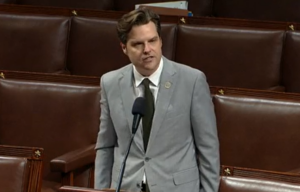The House picked up consideration of the fiscal year 2024 National Defense Authorization on Thursday debating more contentious Republican-led measures, to include provisions aimed at cutting the U.S.’ security assistance for Ukraine.
The House Rules Committee late Wednesday evening made in order 80 additional amendments for consideration on the floor, with the panel’s top Democrat adding the “extreme” amendments proposed by GOP members may impact the likelihood of passing the annual defense policy bill.

“Looking at how extreme some of the Republican amendments are that were made in order, I’d be surprised if this bill can even pass the House,” Rep. Jim McGovern (D-Mass.), ranking member on the Rules Committee, said Thursday on the floor. “We’re here debating social issues in a defense bill because the far right, the MAGA fringe, the Freedom Caucus, they are obsessed with these culture wars. They say Democrats are the ones injecting social issues into the military but make no mistake, they are the ones that are doing that.”
The House Armed Services Committee previously voted near unanimously on June 22 to advance its $886 billion FY ‘24 NDAA, which followed more than 12 hours of debate and its own consideration of hundreds of amendments (Defense Daily, June 22).
On Wednesday, the House adopted 290 amendments to the NDAA which included more bipartisan, less contentious measures such as blocking funds for the Air Force to decommission any Boeing [BA] KC-135 tankers in FY ‘24, calling for DoD to look at increasing production capacity of the Army’s new Lockheed Martin [LMT]-built Precision Strike Missile and requiring DoD to submit a classified report on national security risks posed by China and Russia’s space activities (Defense Daily, July 12).
Additional amendments adopted as part of the first rule for the NDAA include establishing a Senate-confirmed Special Inspector General for Ukraine Assistance position, requiring a report on DoD’s progress to achieve a clean audit and directing the Pentagon to produce a classified report on requirements to bolster the U.S. “capacity to resist force” in the event of a Chinese attack on Taiwan.
Thursday’s more intense debate, which was still ongoing as of Defense Daily’s deadline with many measures awaiting final votes, shifted focus to more amendments offered by conservative members ranging from reversing Pentagon’s policies on transgender healthcare services and abortion to blocking the department’s Diversity, Equity and Inclusion (DEI) efforts.
Rep. Tom Cole (R-Okla.), chair of the Rules Committee, acknowledged there would be “spirited debate” over the issues presented Thursday, while urging continued support for the NDAA and noting the bill is likely to continue evolving as it eventually moves into conference with the Senate’s version of the legislation.
“I know some in this House will express frustration with the process. And, yes, perhaps it would have been more convenient for us to have done our work more quickly. But, as this House is well aware, the NDAA is one of the most critical pieces of legislation the House considers each year,” Cole said on the floor. “That’s all to say, I suspect the process will continue to change the product as we move along. So, again, I wouldn’t be too giddy if I won today. I wouldn’t be disappointed, no matter what your particular issue is, if I lost.”
Rep. Marjorie Taylor Greene (R-Ga.) also offered an amendment that would cut $300 million from the bill’s authorized funding for security assistance to assist Ukraine in its fight against Russia’s ongoing invasion.
“No money funding and fueling the Ukraine war belongs in our National Defense Authorization Act because this is for our nation, not for another nation, not for Ukraine. Ukraine is not the 51st state. Sending money to fund a war in a foreign country does not deter war, it continues it, it causes it, it enables it and it allows it,” Greene said.
Rep. Matt Gaetz (R-Fla.) went a step further and proposed a measure that would block more weapons aid to Ukraine entirely.
“I offer this amendment because the Biden administration is sleepwalking our great country into a world war. The American people did not sign up for this and I believe Congress needs to have the solemnity to be able to stop this madness,” Gaetz said.
Both Democrats and Republicans, to include Reps. Victoria Spartz (R-Ind.) and Joe Wilson (R-S.C.), spoke in opposition to the two amendments.
“What we are doing is we are supporting a sovereign democratic Ukraine against a tyrannical dictator who is trying to take over that country through violence. If Putin succeeds in Ukraine, he won’t stop at Ukraine,” Rep. Adam Smith (D-Wash.), chair of the House Armed Services Committee, said on the floor.
The proposals to cut Ukraine aid, which will receive roll call votes later this evening, followed a joint declaration from President Biden and G-7 leaders on Wednesday to establish “bilateral security commitments and arrangements” that will “formalize” long-term support for [Ukraine’s] defense, rebuilding and “integration into the Euro-Atlantic community” (Defense Daily, July 12).
“We will not waver,” Biden said later on Wednesday during an address at Vilnius Univ. in Lithuania, which hosted this week’s NATO summit. “I mean that. Our commitment to Ukraine will not weaken. We will stand for liberty and freedom today, tomorrow and for as long as it takes.”